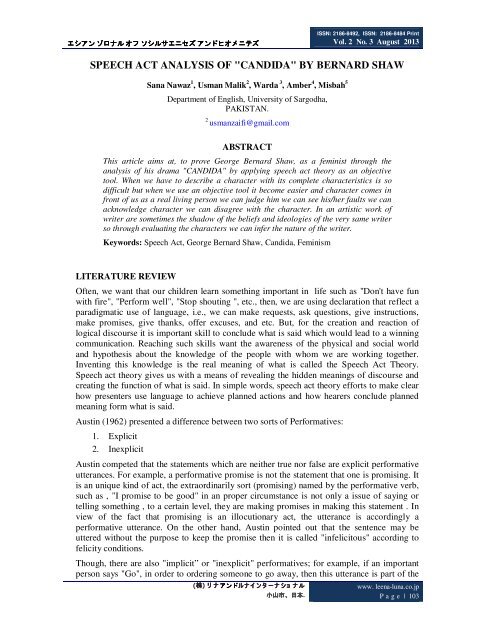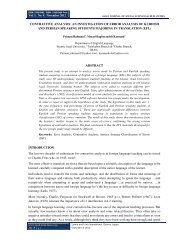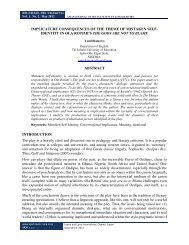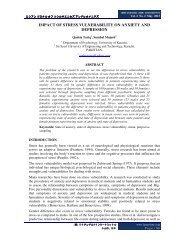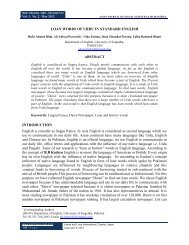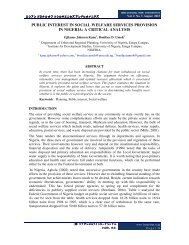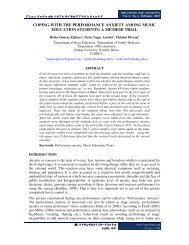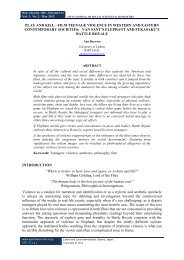speech act analysis of "candida" by bernard shaw - Asian Journal of ...
speech act analysis of "candida" by bernard shaw - Asian Journal of ...
speech act analysis of "candida" by bernard shaw - Asian Journal of ...
You also want an ePaper? Increase the reach of your titles
YUMPU automatically turns print PDFs into web optimized ePapers that Google loves.
エシアン ゾロナル オフ ソシルサエニセズ アンドヒオメニテズ<br />
ISSN: 2186-8492, ISSN: 2186-8484 Print<br />
Vol. 2 No. 3 August 2013<br />
SPEECH ACT ANALYSIS OF "CANDIDA" BY BERNARD SHAW<br />
Sana Nawaz 1 , Usman Malik 2 , Warda 3 , Amber 4 , Misbah 5<br />
Department <strong>of</strong> English, University <strong>of</strong> Sargodha,<br />
PAKISTAN.<br />
2<br />
usmanzaifi@gmail.com<br />
ABSTRACT<br />
This article aims at, to prove George Bernard Shaw, as a feminist through the<br />
<strong>analysis</strong> <strong>of</strong> his drama "CANDIDA" <strong>by</strong> applying <strong>speech</strong> <strong>act</strong> theory as an objective<br />
tool. When we have to describe a char<strong>act</strong>er with its complete char<strong>act</strong>eristics is so<br />
difficult but when we use an objective tool it become easier and char<strong>act</strong>er comes in<br />
front <strong>of</strong> us as a real living person we can judge him we can see his/her faults we can<br />
acknowledge char<strong>act</strong>er we can disagree with the char<strong>act</strong>er. In an artistic work <strong>of</strong><br />
writer are sometimes the shadow <strong>of</strong> the beliefs and ideologies <strong>of</strong> the very same writer<br />
so through evaluating the char<strong>act</strong>ers we can infer the nature <strong>of</strong> the writer.<br />
Keywords: Speech Act, George Bernard Shaw, Candida, Feminism<br />
LITERATURE REVIEW<br />
Often, we want that our children learn something important in life such as "Don't have fun<br />
with fire", "Perform well", "Stop shouting ", etc., then, we are using declaration that reflect a<br />
paradigmatic use <strong>of</strong> language, i.e., we can make requests, ask questions, give instructions,<br />
make promises, give thanks, <strong>of</strong>fer excuses, and etc. But, for the creation and re<strong>act</strong>ion <strong>of</strong><br />
logical discourse it is important skill to conclude what is said which would lead to a winning<br />
communication. Reaching such skills want the awareness <strong>of</strong> the physical and social world<br />
and hypothesis about the knowledge <strong>of</strong> the people with whom we are working together.<br />
Inventing this knowledge is the real meaning <strong>of</strong> what is called the Speech Act Theory.<br />
Speech <strong>act</strong> theory gives us with a means <strong>of</strong> revealing the hidden meanings <strong>of</strong> discourse and<br />
creating the function <strong>of</strong> what is said. In simple words, <strong>speech</strong> <strong>act</strong> theory efforts to make clear<br />
how presenters use language to achieve planned <strong>act</strong>ions and how hearers conclude planned<br />
meaning form what is said.<br />
Austin (1962) presented a difference between two sorts <strong>of</strong> Performatives:<br />
1. Explicit<br />
2. Inexplicit<br />
Austin competed that the statements which are neither true nor false are explicit performative<br />
utterances. For example, a performative promise is not the statement that one is promising. It<br />
is an unique kind <strong>of</strong> <strong>act</strong>, the extraordinarily sort (promising) named <strong>by</strong> the performative verb,<br />
such as , "I promise to be good" in an proper circumstance is not only a issue <strong>of</strong> saying or<br />
telling something , to a certain level, they are making promises in making this statement . In<br />
view <strong>of</strong> the f<strong>act</strong> that promising is an illocutionary <strong>act</strong>, the utterance is accordingly a<br />
performative utterance. On the other hand, Austin pointed out that the sentence may be<br />
uttered without the purpose to keep the promise then it is called "infelicitous" according to<br />
felicity conditions.<br />
Though, there are also "implicit” or "inexplicit" performatives; for example, if an important<br />
person says "Go", in order to ordering someone to go away, then this utterance is part <strong>of</strong> the<br />
( 株 ) リ リ<br />
アンドル リ ル ル ル ル リ ル ル リ ル<br />
小 山 市 、 日 本 .<br />
www. leena-luna.co.jp<br />
P a g e | 103
ISSN: 2186-8492, ISSN: 2186-8484 Print<br />
Vol. 2 No. 3 August 2013<br />
ASIAN JOURNAL OF SOCIAL SCIENCES & HUMANITIES<br />
performance <strong>of</strong> a command. According to Austin, This statement is neither true nor false; so<br />
the sentence is a performative; up till now, it is not an explicit performative, since it is not<br />
clear that the speaker is performing an <strong>act</strong> <strong>of</strong> command.<br />
In addition, the same utterance could at the same time constitute three kinds <strong>of</strong> <strong>act</strong>s:<br />
1. A locutionary <strong>act</strong>: Saying something (the locution) with a definite meaning in usual<br />
sense<br />
2. An illocutionary <strong>act</strong> (or illocution): the performance <strong>of</strong> an <strong>act</strong> in saying something.<br />
3. A perlocutionary <strong>act</strong> (or perlocution): The <strong>act</strong> performed <strong>by</strong> means <strong>of</strong> what is said.<br />
Searle identified five illocutionary/perlocutionary points:<br />
Assertive: statements may be judged true or false because they intend to explain a state <strong>of</strong><br />
dealings in the world.<br />
Directives: the speaker's role is to get the hearer to do something.<br />
Commissives: statements which hand over the speaker to a course <strong>of</strong> <strong>act</strong>ion as described <strong>by</strong><br />
the propositional content.<br />
Declaratives: statements that effort to change the world <strong>by</strong> “representing it as having been<br />
changed”.<br />
Expressive: these express a personal condition <strong>of</strong> the speaker. They have a tendency to be<br />
basically polite as in greeting, thanking, congratulating, etc.<br />
INTRODUCTION OF "CANDIDA"<br />
Candida was written in 1894 and published in 1898 <strong>by</strong> George Bernard Shaw.<br />
There are three main char<strong>act</strong>ers in this drama which are:<br />
I. Candida<br />
II. Morell<br />
III. MarchBanks<br />
Candida is a house wife and a wife in-law to Mr.Morell is a reverent clergyman. He used to<br />
give lectures to different society about socialism and MarchBank a young poet who wants to<br />
rescue her from what he presumes to be her dull family life. MarchBank is in love with<br />
Candida and believes she deserves something more than just complacency from her husband.<br />
The drama revolves around the conflict <strong>of</strong> love between these three persons.<br />
Feminism<br />
Feminism is a set <strong>of</strong> <strong>act</strong>ions and beliefs intended at defining, creating, and protecting equal<br />
political, financial, and public rights for women.<br />
Before the mid <strong>of</strong> the 19thcentury women were believe weak mentally and physically such<br />
conceptions was joint <strong>by</strong> social meeting, according to that thought society has divided into<br />
two world private and public work. They were knowledgeable only in a way that suitable for<br />
their weak nature such as sewing, nursing and painting, the only work for women was<br />
marriage according to that law, women could not revolt because <strong>of</strong> terror, dishonor, and<br />
negative response <strong>by</strong> society. Public world implied that Men’s are strong mentally and<br />
physically they were allowed to work and were given proper education such as mathematics<br />
and science etc. the sole vocation <strong>of</strong> men was to work and built society. Feminism is against<br />
patriarchal society (which is a male dominant society).<br />
www.ajssh.leena-luna.co.jp<br />
104 | P a g e<br />
Leena and Luna International, Oyama, Japan.<br />
Copyright © 2013
エシアン ゾロナル オフ ソシルサエニセズ アンドヒオメニテズ<br />
ISSN: 2186-8492, ISSN: 2186-8484 Print<br />
Vol. 2 No. 3 August 2013<br />
Analysis <strong>of</strong> a Text Candida: (Act 3)<br />
Text<br />
MARCHBANKS: (on the s<strong>of</strong>a hugging his<br />
ankles). Oh, she forgave you, just as she<br />
forgives me for being a coward, and a<br />
weakling, and what you call a sniveling little<br />
whelp and all the rest <strong>of</strong> it.<br />
(Dreamily.) A woman like that has divine<br />
insight: she loves our souls, and not our<br />
follies and vanities and illusions, or our<br />
collars and coats, or any other <strong>of</strong> the rags<br />
and tatters we are rolled up in. (He reflects<br />
on this for an instant; then turns intently to<br />
question Morell.) What I want to know is<br />
how you got past the flaming sword that<br />
stopped me.<br />
MARCHBANKS: Misery! I am the happiest<br />
<strong>of</strong> men. I desire nothing now but her<br />
happiness. (With dreamy enthusiasm.) Oh,<br />
Morell let us both give her up. Why should<br />
she have to choose between a wretched little<br />
nervous disease like me, and a pig-headed<br />
parson like you Let us go on a pilgrimage,<br />
you to the east and I to the<br />
west, in search <strong>of</strong> a worthy lover for her--<br />
some beautiful<br />
archangel with purple wings<br />
Morell: send for her and let her choose<br />
between--(The door opens and Candida<br />
enters. He stops as if petrified.)<br />
MORELL: Candida, my dear: this<br />
altercation is hardly quite seemingly. It is a<br />
matter between two men; and I am the right<br />
person to settle it.<br />
Analysis<br />
Oh, she forgave you(re<strong>act</strong>ion)<br />
just as she forgives me for being a coward,<br />
and a weakling,(inform)<br />
and what you call a sniveling little whelp<br />
and all the rest <strong>of</strong> it(question)<br />
A woman like that has divine insight<br />
(opinion, statement)<br />
she loves our souls, and not our follies and<br />
vanities and illusions, or our collars and<br />
coats, or any other <strong>of</strong> the rags and tatters we<br />
are rolled up in.(opine, statement, inform)<br />
What I want to know is how you got past the<br />
flaming sword that stopped me.(question,<br />
check)<br />
Misery! I am the happiest <strong>of</strong> men. I desire<br />
nothing now but her happiness.(re<strong>act</strong>ion)<br />
Oh, Morell let us both give her<br />
up.(suggestion)<br />
Why should she have to choose between a<br />
wretched little nervous disease like me, and<br />
a pig-headed parson like you(question,<br />
query)<br />
Let us go on a pilgrimage, you to the east<br />
and I to the<br />
west, in search <strong>of</strong> a worthy lover for her--<br />
some beautiful<br />
archangel with purple wings.(suggestion)<br />
send for her and let her choose between—<br />
(evaluate)<br />
Candida, my dear: (alert)<br />
this altercation is hardly quite seemingly. It<br />
is a matter between two men; and I am the<br />
right person to settle it.(inform, opine,<br />
statement)<br />
( 株 ) リ リ<br />
アンドル リ ル ル ル ル リ ル ル リ ル<br />
小 山 市 、 日 本 .<br />
www. leena-luna.co.jp<br />
P a g e | 105
ISSN: 2186-8492, ISSN: 2186-8484 Print<br />
Vol. 2 No. 3 August 2013<br />
ASIAN JOURNAL OF SOCIAL SCIENCES & HUMANITIES<br />
MORELL: (gently snubbing her). You need<br />
not understand, my dear.<br />
MORELL: (pushing Eugene away without<br />
deigning to look at him). I hope you don't<br />
mean that as a threat, Candida.<br />
CANDIDA: (with emphatic warning). Take<br />
care, James. Eugene: I asked you to go. Are<br />
you going<br />
CANDIDA: Stop! (He obeys.) Didn't you<br />
hear James say he wished you to stay<br />
James is master here. Don't you know that<br />
MARCHBANKS: (flushing with a young<br />
poet's rage against tyranny). By what right is<br />
he master<br />
CANDIDA: (slowly recoiling a step, her<br />
heart hardened <strong>by</strong> his rhetoric in spite <strong>of</strong> the<br />
sincere feeling behind it). Oh! I am to<br />
choose, am I I suppose it is quite settled<br />
that I must belong to one or the other.<br />
MARCHBANKS: (anxiously). Morell: you<br />
don't understand. She means that she<br />
belongs to herself.<br />
CANDIDA: (turning on him). I mean that<br />
and a good deal more,<br />
Master Eugene, as you will both find out<br />
presently. And pray my lords and masters,<br />
what have you to <strong>of</strong>fer for my choice I am<br />
up for auction, it seems. What do you bid,<br />
James<br />
MORELL: (with proud humility). I have<br />
nothing to <strong>of</strong>fer you but my strength for<br />
your defense, my honesty <strong>of</strong> purpose for<br />
your surety, my ability and industry for your<br />
livelihood, and my authority and position for<br />
your dignity. That is all it becomes a man to<br />
<strong>of</strong>fer to a woman.<br />
You need not understand, my dear.(alert,<br />
inform, suggest)<br />
I hope you don't mean that as a threat,<br />
Candida.(call-<strong>of</strong>f, check, query, alert)<br />
Take care, James.(alert)<br />
I asked you to go. Are you going(check,<br />
repair move)<br />
Didn't you hear James say he wished you to<br />
stay(query, question)<br />
James is master here.(inform)<br />
Don't you know that(question, check)<br />
By what right is he master(question)<br />
Oh! (re<strong>act</strong>ion)I am to choose, am<br />
I(inform, check)<br />
you don't understand.(check)<br />
She means that she belongs to<br />
herself.(inform)<br />
I mean that and a good deal more, Master<br />
Eugene, as you will both find out<br />
presently.(confirm, inform)<br />
And pray my lords and masters, what have<br />
you to <strong>of</strong>fer for my choice(question)<br />
I am up for auction, it seems.(inform)<br />
What do you bid, James(question, check)<br />
I have nothing to <strong>of</strong>fer you but my strength<br />
for your defense, my honesty <strong>of</strong> purpose for<br />
your surety, my ability and industry for your<br />
livelihood, and my authority and position for<br />
your dignity.(<strong>of</strong>fer)<br />
That is all it becomes a man to <strong>of</strong>fer to a<br />
woman.(call-<strong>of</strong>f,)<br />
www.ajssh.leena-luna.co.jp<br />
106 | P a g e<br />
Leena and Luna International, Oyama, Japan.<br />
Copyright © 2013
エシアン ゾロナル オフ ソシルサエニセズ アンドヒオメニテズ<br />
ISSN: 2186-8492, ISSN: 2186-8484 Print<br />
Vol. 2 No. 3 August 2013<br />
Candida: Ask ME what it costs to be James's<br />
mother and three sisters and wife and<br />
mother to his children all in one. Ask Prossy<br />
and Maria how troublesome the house is<br />
even when we have no visitors to help us to<br />
slice the onions. I make him master here.<br />
MORELL: (quite overcome, kneeling beside<br />
her chair and embracing her with boyish<br />
ingenuousness). It's all true, every word.<br />
What<br />
I am you have made me with the labor <strong>of</strong><br />
your hands and the love <strong>of</strong> your heart! You<br />
are my wife, my mother, and my sisters: you<br />
are the sum <strong>of</strong> all loving care to me.<br />
Ask ME what it costs to be James's mother<br />
and three sisters and wife and mother to his<br />
children all in one.(reply, statement, check)<br />
Ask Prossy and Maria how troublesome the<br />
house is even when we have no visitors to<br />
help us to slice the onions. (reply,<br />
statement)<br />
I make him master here.(inform, statement)<br />
It's all true, every word.(acknowledge)<br />
What I am you have made me with the labor<br />
<strong>of</strong> your hands and the love <strong>of</strong> your heart!<br />
You are my wife, my mother, and my<br />
sisters: you are the sum <strong>of</strong> all loving care to<br />
me.(agree, re<strong>act</strong>, reply)<br />
List <strong>of</strong> <strong>act</strong>s<br />
Surprise: An unexpected or astonishing event, f<strong>act</strong>, or thing.<br />
Greet: The <strong>act</strong>ion <strong>of</strong> giving such a sign.<br />
Congratulate: Give (someone) one's good wishes when something special or pleasant has<br />
happened to them.<br />
Thank: Express gratitude to (someone),<br />
Apologize: Express regret for something that one has done wrong<br />
Threaten: Having a hostile or deliberately frightening quality or manner<br />
Promise: A declaration or assurance that one will do a particular thing or that guarantees that<br />
a particular thing will happen<br />
Offer: Present or pr<strong>of</strong>fer (something) for (someone) to accept or reject as so desired<br />
Respond: Say something in reply<br />
Order: A state in which everything is in its correct or appropriate place<br />
Elicit: A sentence worded or expressed so as to elicit information<br />
Request: An <strong>act</strong> <strong>of</strong> asking politely or formally for something<br />
Wish: Feel or express a strong desire or hope for something that is not easily attainable; want<br />
something that cannot or probably will not happen<br />
Conclude: Bring (something) to an end<br />
Check: Verify or establish to one's satisf<strong>act</strong>ion<br />
Inform: Give (someone) f<strong>act</strong>s or information<br />
Re<strong>act</strong>: Respond or behave in a particular way<br />
Suggest: Put forward for consideration<br />
Opine: Hold and state as one's opinion<br />
Acknowledge: Accept or admit the existence or truth<br />
( 株 ) リ リ<br />
アンドル リ ル ル ル ル リ ル ル リ ル<br />
小 山 市 、 日 本 .<br />
www. leena-luna.co.jp<br />
P a g e | 107
ISSN: 2186-8492, ISSN: 2186-8484 Print<br />
Vol. 2 No. 3 August 2013<br />
ASIAN JOURNAL OF SOCIAL SCIENCES & HUMANITIES<br />
Check: Examine (something) in order to determine its accuracy, quality, or condition, or to<br />
detect the presence <strong>of</strong> something<br />
Table 1<br />
Candida<br />
Acts Frequency Percentage<br />
Check 3 20%<br />
Inform 4 26.67%<br />
Elicit 4 26.67%<br />
Re<strong>act</strong> 1 6.67%<br />
Replay 2 13.33%<br />
Alert 1 6.67%<br />
Total 15<br />
Table 2<br />
MARCHBANK<br />
Acts Frequency Percentage<br />
Re<strong>act</strong> 2 13.33%<br />
Elicit 4 26.67%<br />
Inform 3 20%<br />
Opine 2 13.33%<br />
Check 2 13.33%<br />
Suggestion 2 13.33%<br />
Total 15<br />
Table 3<br />
Morell<br />
Acts Frequency Percentage<br />
Alert 1 11.11%<br />
Inform 1 11.11%<br />
Opine 1 11.11%<br />
Check 1 11.11%<br />
Offering 1 11.11%<br />
Acknowledge 1 11.11%<br />
Reply 1 11.11%<br />
Re<strong>act</strong> 1 11.11%<br />
Elicit 1 11.11%<br />
Total 9<br />
www.ajssh.leena-luna.co.jp<br />
108 | P a g e<br />
Leena and Luna International, Oyama, Japan.<br />
Copyright © 2013
エシアン ゾロナル オフ ソシルサエニセズ アンドヒオメニテズ<br />
ISSN: 2186-8492, ISSN: 2186-8484 Print<br />
Vol. 2 No. 3 August 2013<br />
CONCLUSION<br />
As the f<strong>act</strong>s and figures shows that Candida <strong>of</strong>ten goes to re<strong>act</strong> why she is asked <strong>by</strong> char<strong>act</strong>er<br />
instead <strong>of</strong> replying. She uses the <strong>act</strong> like check, inform, elicit etc in more frequency then any<br />
char<strong>act</strong>er in the drama. These performative <strong>act</strong>s show the independent shows the nature <strong>of</strong><br />
Candida. She is not submissive in front <strong>of</strong> any char<strong>act</strong>er even not before her husband.<br />
One more important feature about Candida which is unrevealed through this <strong>analysis</strong> is that<br />
she controls the conversation in the play. As the f<strong>act</strong> shows that out <strong>of</strong> total utterances (247)<br />
she has spoken (73) utterances in <strong>act</strong> 3 which are the 29% <strong>of</strong> the total conversation <strong>of</strong> the <strong>act</strong><br />
3 <strong>of</strong> the play. As the f<strong>act</strong>s show that Candida is the only char<strong>act</strong>er in the play, who is making<br />
the <strong>act</strong>s (Inform 26.67%, Elicit 26.67%, Check 20%, Reply 13.33%) in more frequency than<br />
any char<strong>act</strong>er <strong>of</strong> the play. She is controlling the conversation in play. Candida has the ability<br />
<strong>of</strong> “Topic Shifting”. She has been given the power <strong>of</strong> decision making. Wordsworth portrayal<br />
<strong>of</strong> Candida as independent and liberal woman shows his ideology <strong>of</strong> feminism.<br />
REFERENCES<br />
Austin, J. L. (1962). How to do things with words. Oxford: Oxford University Press.<br />
Cook, G. (1992). Discourse. Oxford: Oxford University Press.<br />
Oxford (2000). Oxford advanced learner dictionary. Oxford: Oxford University Press.<br />
Searle, J. R. (1975). Taxonomy <strong>of</strong> Illocutionary Acts. In Günderson, K. (ed.). Language,<br />
Mind, and Knowledge, Minneapolis, vol. 7<br />
Searle, J. R. (1979). A Classification <strong>of</strong> Illocutionary Acts. In Andy Rogers Bob Wall and P.<br />
Murphy (ed.s), Proceeding <strong>of</strong> Texts Conference on Performatives. Prepositions and<br />
Implicatures. Washington, DC: Center for Applied Linguistics.<br />
Searle, J. R. & Daniel, V.(1985). Foundations <strong>of</strong> Illocutionary Logic. Cambridge: Cambridge<br />
University Press.<br />
http://www.ojs.academypublisher.com/index.php/jltr/article/download/.../3855<br />
http://www.changingminds.org/explanations/theories/<strong>speech</strong>_<strong>act</strong>.htm<br />
( 株 ) リ リ<br />
アンドル リ ル ル ル ル リ ル ル リ ル<br />
小 山 市 、 日 本 .<br />
www. leena-luna.co.jp<br />
P a g e | 109


